Regional View: Northwest Arkansas
The healthcare landscape in Northwest Arkansas is evolving at a rapid pace. Population growth and increasing demand for care are creating unique opportunities for expansion and innovation in the health sector. ACHI continues to transform health data into actionable solutions for decision makers, providing insights on this fast-growing region.
MATERNAL BEHAVIORAL HEALTH EVENTS DURING THE BIRTHING JOURNEY IN NORTHWEST ARKANSAS
Addressing perinatal behavioral health is crucial for ensuring the well-being of new mothers. Perinatal behavioral health events impact both mothers and their families during a critical time in their lives. This analysis, part of our continuing effort to examine each step of the birthing journey in Arkansas, looks at behavioral health events — including outpatient visits, emergency room visits, and inpatient stays — among new Arkansas moms in Northwest Arkansas.
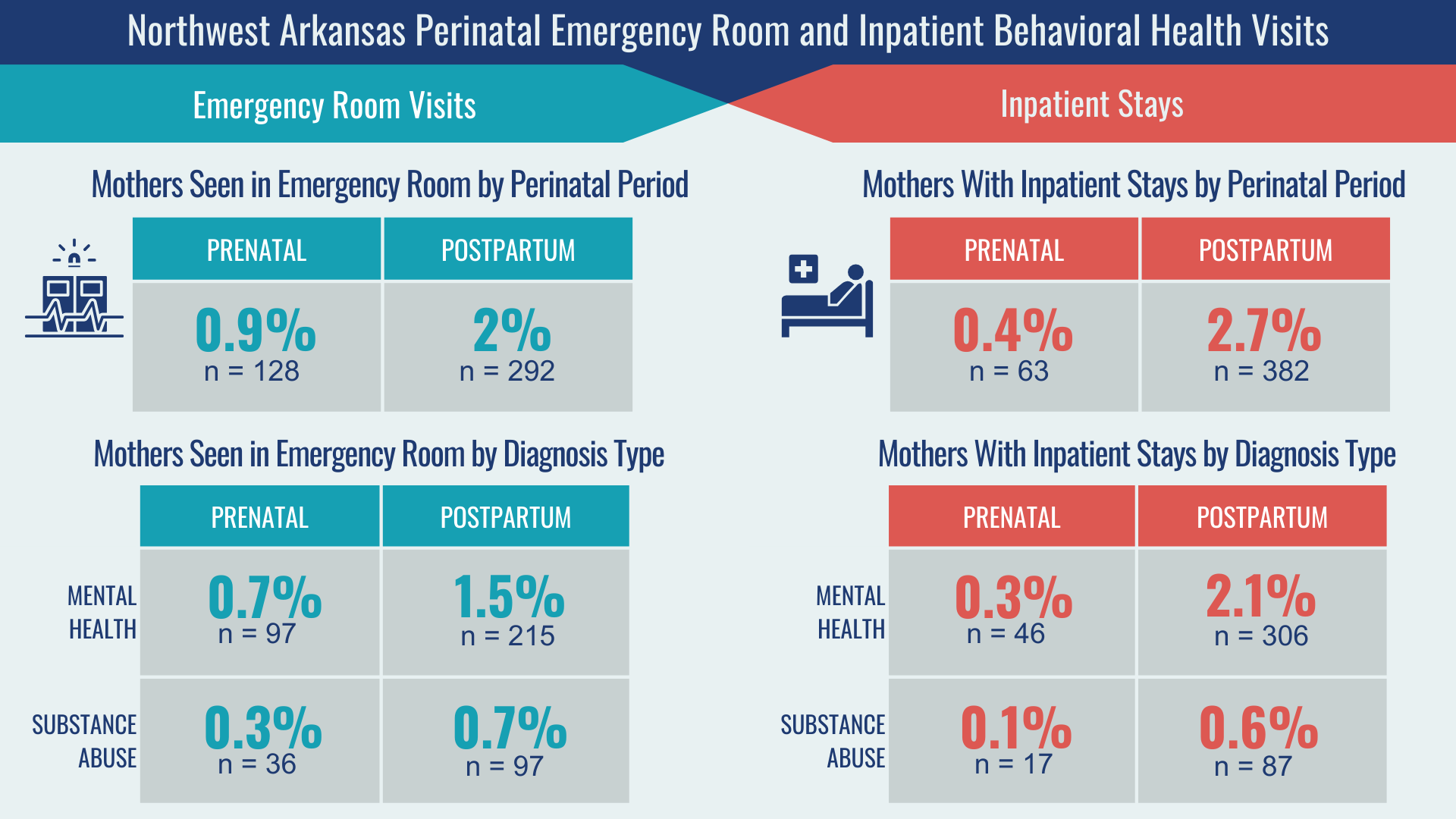
ACHI examined behavioral health events in the prenatal and postpartum periods among 14,400 Northwest Arkansas mothers who gave birth between Jan. 1, 2019, and June 30, 2022, with Northwest Arkansas defined as Benton, Carroll, Madison, and Washington counties. We also looked at the timing of postpartum mothers’ follow-up visits within 120 days of either an emergency room visit or inpatient stay for a behavioral health event.
Key findings:
- Behavioral health events were more likely to occur in the postpartum period compared to the prenatal period.
- Postpartum mothers consistently had lower follow-up visit rates after an emergency room visit or an inpatient stay compared to all women ages 18-44 in Northwest Arkansas.
- 61% of postpartum mothers had no outpatient follow-up behavioral health visit within 120 days of an emergency room visit.
- 60% of postpartum mothers had no outpatient follow-up behavioral health visit within 120 days of an inpatient stay.
This information is also available in a statewide, interactive dashboard ACHI developed to examine acute behavioral health events along the birthing journey in Arkansas. See more information about maternal and infant health in Arkansas on our topic page.
Healthcare Utilization and Payment Spotlight
Of the $1.1 billion spent on Northwest Arkansas Medicare enrollees’ health care in 2019, $240 million was spent on services provided outside the region, an analysis by the Arkansas Center for Health Improvement shows.
ACHI analyzed certain aspects of healthcare utilization among Northwest Arkansas residents to gain insight into the needs of the citizens and the demands being placed on the healthcare system of the state’s fastest-growing region. For purposes of the analysis, Northwest Arkansas was defined as Benton, Carroll, Madison and Washington counties. Researchers focused on 2019 to obtain a view of a typical pre-pandemic year.
Heart disease received special focus because it is the leading cause of death among Arkansans and because cardiology is one of the most in-demand types of specialty care.
Total Payments by Location of Service for NWA Medicare Enrollees, 2019
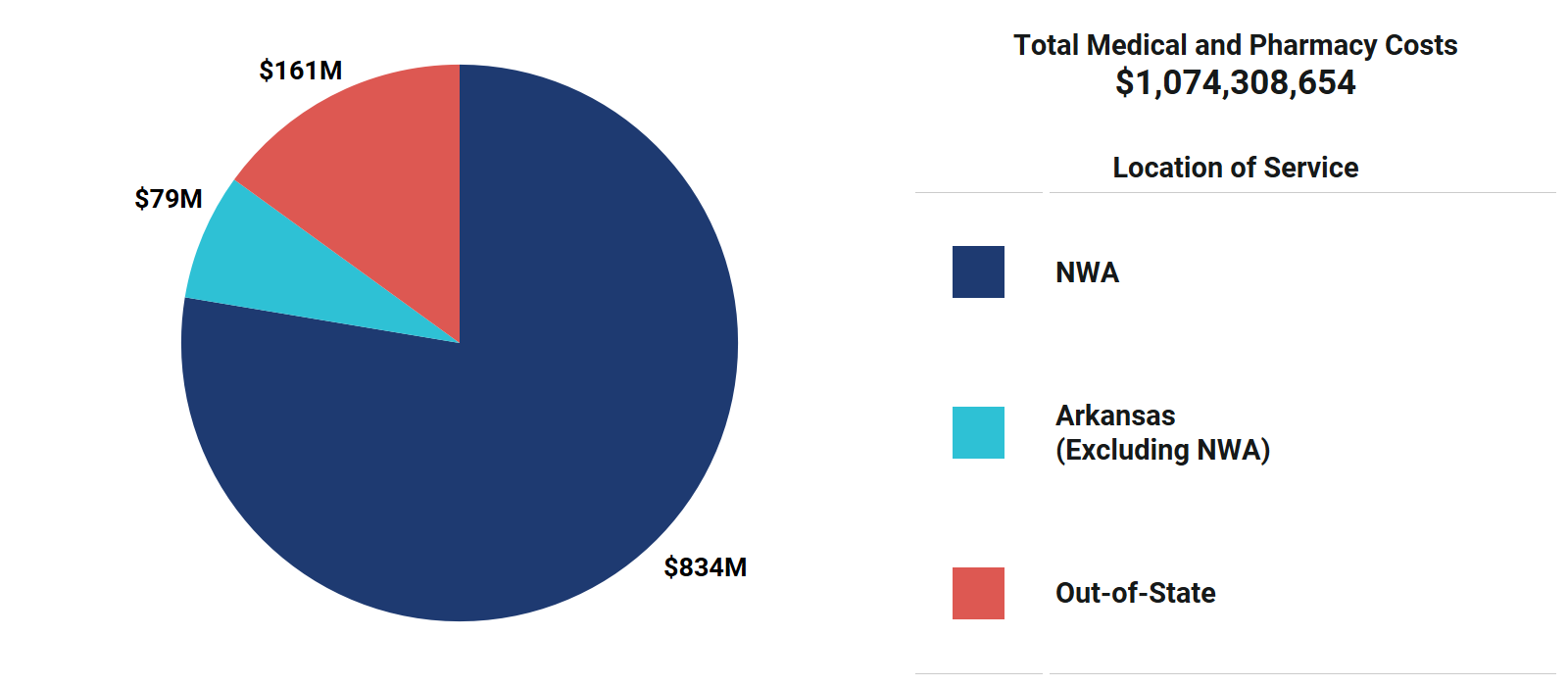
Of the $1.1 billion in total payments for healthcare services or prescriptions for Northwest Arkansas Medicare enrollees in 2019, 22%, or about $240 million, was for services or prescriptions delivered outside the region.
Cardiology Procedures for NWA Medicare Enrollees, 2019
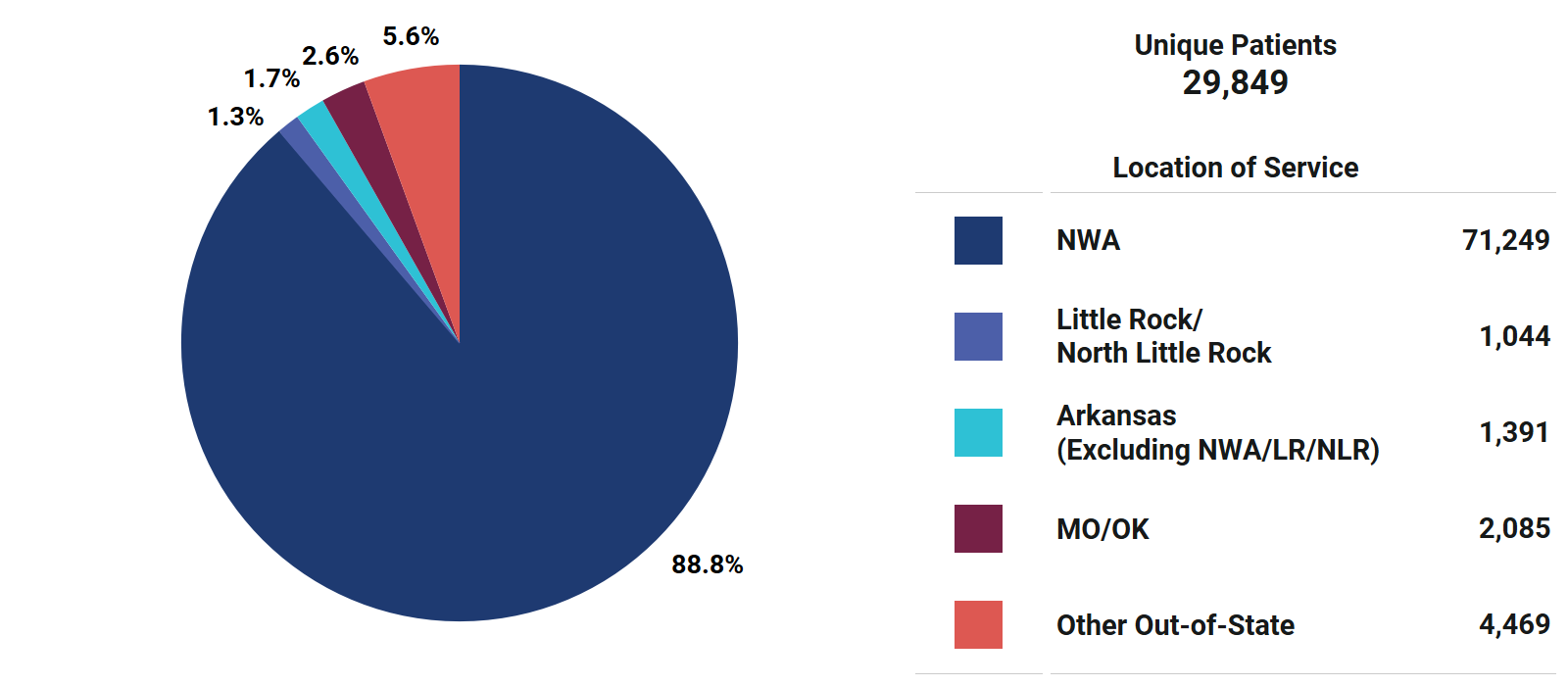
Of the more than 75,000 cardiology procedures performed on Medicare enrollees who lived in Northwest Arkansas in 2019, 11%, or about 9,000, were provided outside the region. The percentages were higher for certain procedures: 14% of coronary artery bypass grafting surgeries and 20% of heart valve replacements were provided outside the region.
Coronary Artery Bypass Grafting (CABG) Procedure Utilization & Location for NWA Medicare Enrollees, 2019
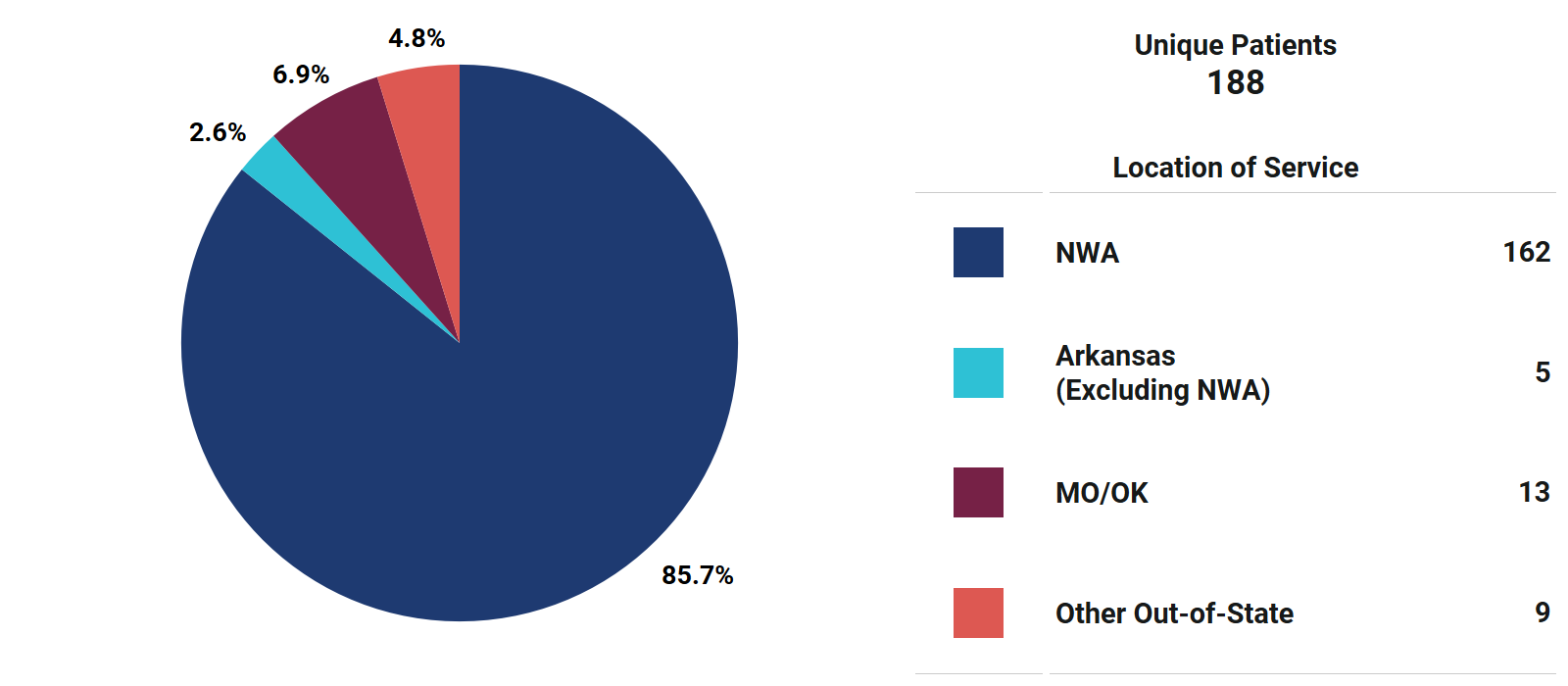
This graphic displays coronary artery bypass grafting (CABG) procedure utilization and location of service for Northwest Arkansas Medicare enrollees.
Valve Replacement Procedure Utilization and Location for NWA Medicare Enrollees, 2019
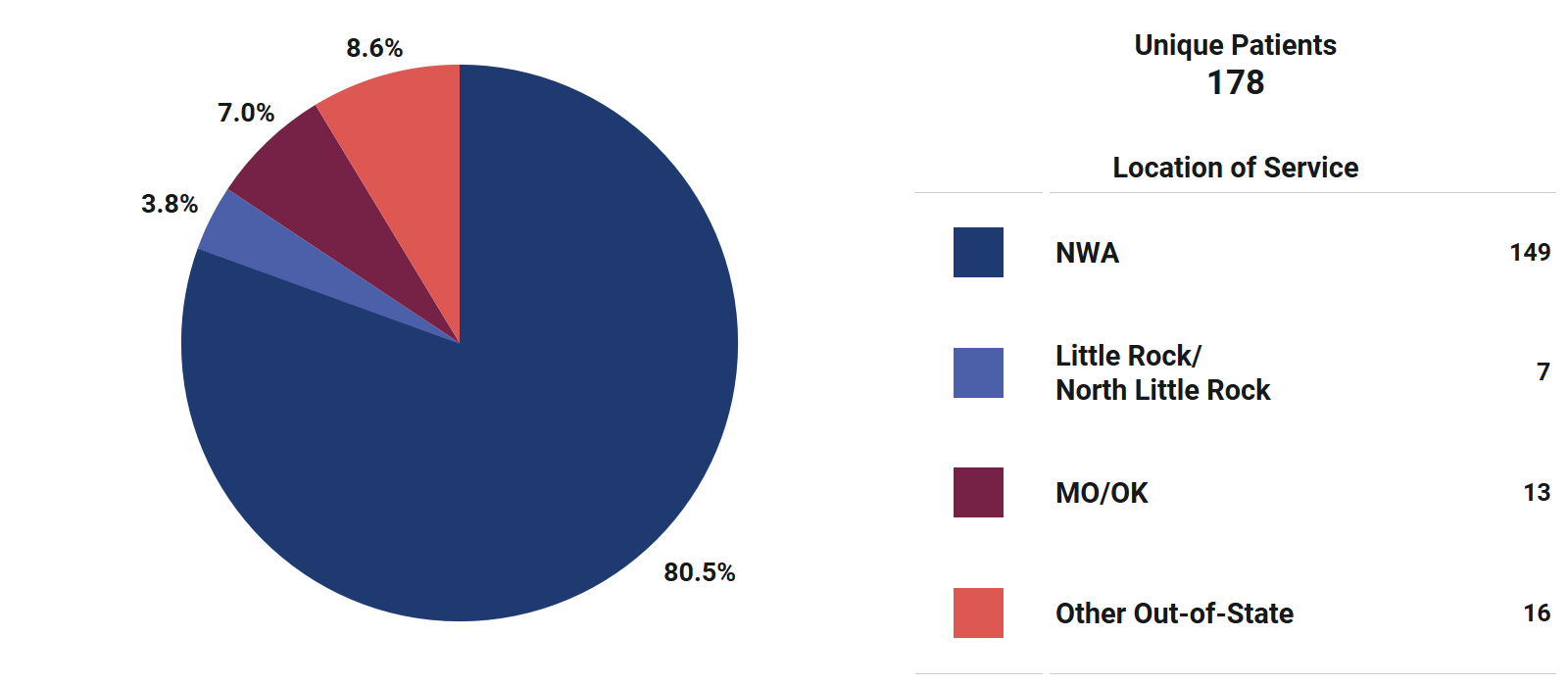
This graphic displays heart valve replacement procedure utilization and location of service for Northwest Arkansas Medicare enrollees.
Northwest Arkansas-Related Explainers
PCMH Case Study: Coordinating Care With High-Priority Patients and Families
UAMS NW Medical School Factsheet
maternal health
One Northwest Arkansas County Meets Definition of Maternity Care Desert
In Northwest Arkansas, Madison County is the only “maternity care desert” — defined as a county without any hospitals or birth centers that offer obstetric care and without any obstetric providers — according to a report by the March of Dimes analyzing Health Resources and Services Administration data. Nearly half of the counties in Arkansas meet this definition, which we discussed in a blog post.
Maternity Care Deserts in Northwest Arkansas and Statewide
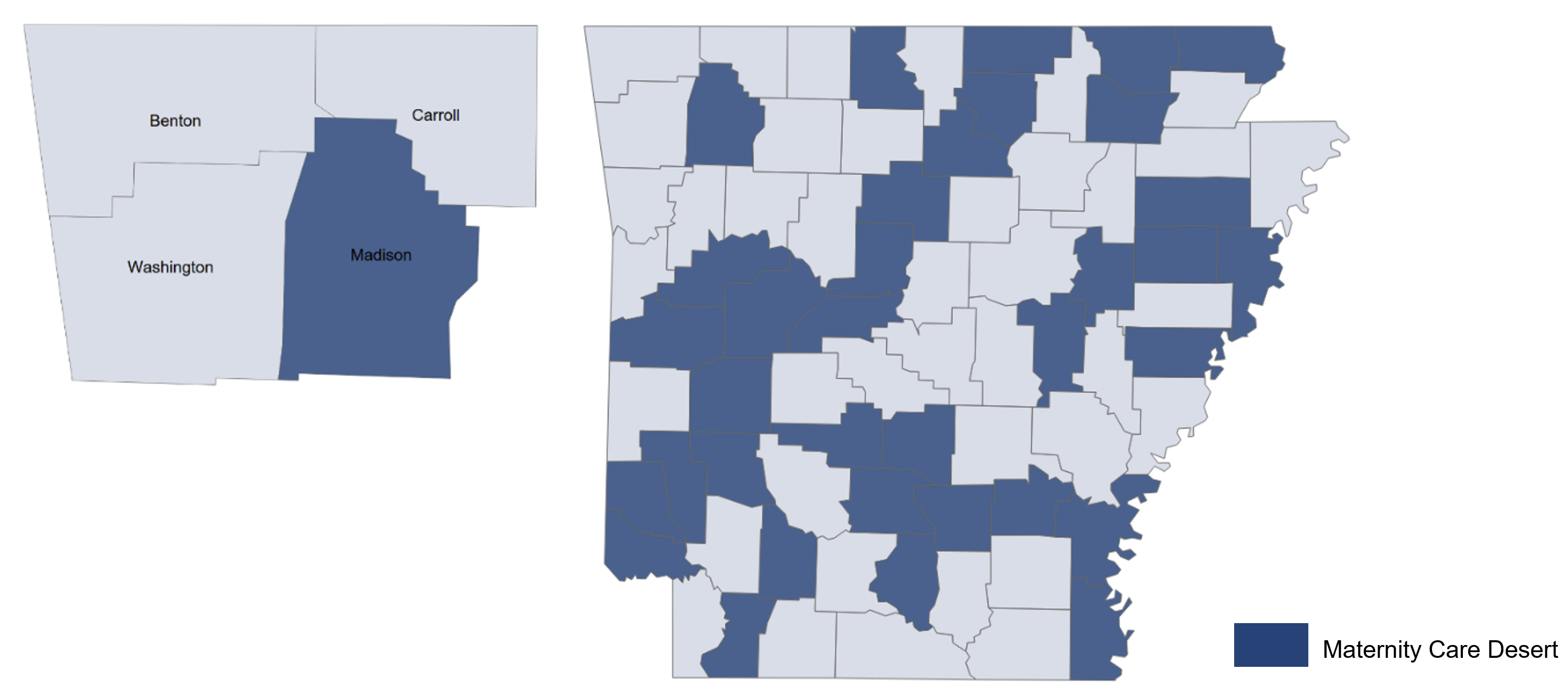
The report notes that the number of counties nationwide meeting the definition of a maternity care desert — 1,119 — represents a 2% increase since the organization released its last report in 2020.
Carroll County, also in Northwest Arkansas, is identified in the analysis as one of four counties in Arkansas that are deemed as having “low access” to maternity care services. Low-access counties are defined as having at most one hospital or birth center providing obstetric care, few obstetric providers, or a high proportion of women 18–64 without health insurance. Carroll County also has the highest uninsured rate among residents aged 18 to 64 of the four counties in the region at 17.6%.
Data from the Centers for Disease Control and Prevention show that Arkansas had the highest maternal mortality rate across all states reporting data, with 40.4 maternal deaths per 100,000 live births between 2018 and 2020. Arkansas also had the third-highest infant mortality rate of all 50 states, with 7.38 infant deaths per 1,000 live births in 2020.











